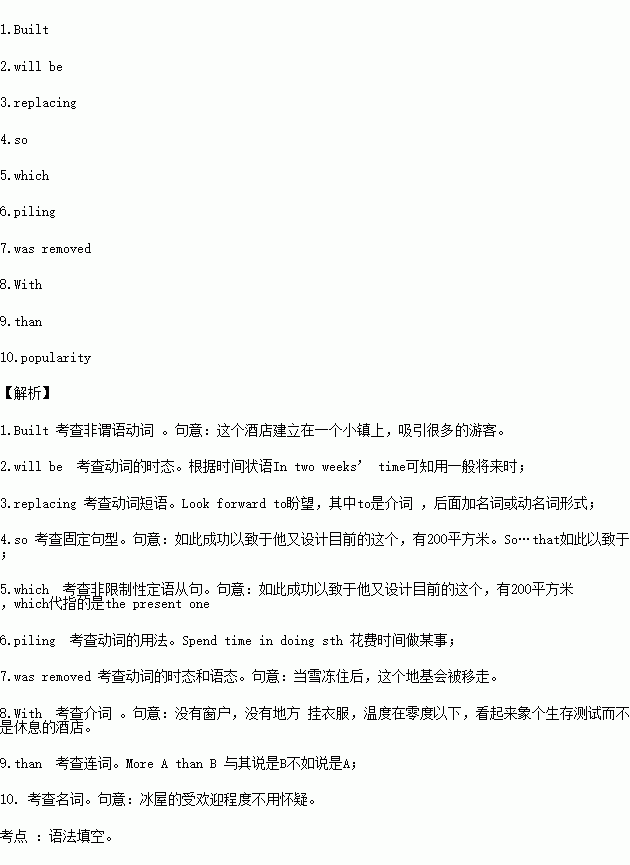题目内容
阅读下面材料,在空白处填入适当的内容或括号内单词的正确形式。
Swedish businessman Nile Bergqvist is delighted with his new hotel, the world’s first igloo(冰屋) hotel.
1._____ (build) in an small town, it has been attracting lots of visitors but soon the fun will be over. In two weeks’ time Bergqvist’s ice creation2._______ (be) nothing more than a pool of water. “We don’t see it as a big problem, ”he says. “We just look forward to 3.______(replace)it. ”
Bergqvist built his first igloo in 1991 for an art exhibition. It was4.______ successful that he designed the present one, 5.______ measures roughly 200 square meters. Six workmen spent more than eight weeks6.______ (pile)1,000 tons of snow onto a wooden base;when the snow froze, the base7.______ (remove).
After their stay, all visitors receive a survival certificate recording their success. 8._____no windows, nowhere to hang clothes and temperatures below 0°C, it may seem more like a survival test 9._____ a relaxing hotel break. “It’s great fun,” Bergqvist explains, “As well as a good start in survival training.’’
The10.______ (popular)of the igloo is beyond doubt:it is now attracting tourists from all over the world. At least 800 people have stayed at the igloo this season even though there are only 10 rooms.
 53随堂测系列答案
53随堂测系列答案请认真阅读下列短文,并根据所读内容在表格中的横线上填入一个最恰当的单词。
注意:请将答案写在答题卡上相应题号的横线上。每个空格只填1个单词。
The GREATEST Journey
I had lunch last week with a high-ranking business woman for a fortune 500 company. I asked her what tips she would give to someone early in their career. Without hesitation she jumped right into four keys to her professional climb:
Know your business. Never get satisfaction with your industry or your position. In most cases, the knowledge you hold now is not good enough to stand the test of time. Thus, you must keep working to stay on top of what’s new and what’s coming down the pipeline. This is what really counts, especially early in a professional career, as many entry level associates are content to be gainfully employed.
Pick careers with care. Again, early in your career it is easy to run after the job that offers the most money. In the case of a life-long career money cannot answer all things. If you are going to be an entrepreneur then you’ll probably start with a budget of zero. Yet, if you have the discipline, working for yourself could be the best choice you’ve ever made.
If you are going to work for a company you have to do your homework. If you find a company that consists with your values and produces a product that you 100% believe in, then you’ll have an easy time giving that organization your all.
Be personable. If everyone hates to be around you at the office, it’s time to check your attitude. We’ve all heard at least one anecdote about a great thinker with great skills who drove coworkers crazy. Someway, somehow many of the brightest and best lack the “people skills” to advance beyond an entry-level position.
In short, you must have the interpersonal insight to interact with internal and external contacts. If not, you may find that you are unimportant once someone with soft-skills joins the organization. Why? People have to buy you before they ever buy the product you’re selling.
Be willing to move. This is where I got puzzled. She shared how she lived in seven states still working for the same organization.
Much is made of moving in today’s attempts to climb the corporate ladder. As more and more companies extend to have a global reach, it is easy to understand why new opportunities birth in various locations.
Whatever the path, outline in your heart what destination you hope to reach and this will be a key indicator as to which journey will be greatest for you.
Title: The Greatest Journey
Passage Outlines | Supporting Details |
Information about a business woman | ●She held a high1. in a fortune 500 company. ●She worked for the same organization2. the fact that she lived in seven states. |
3. on professional climb | Know your business ●Don’t fix eyes on the financial 4. in the initial stage. ●Be modest about your performance in the position, for you need to better your knowledge so as not to lag behind. |
Pick careers 5. ●Don’t run after well-paying jobs early in your career. ●Work in an ideal company and you are willing to be 6. to that organization. | |
Be personable ●7. driving coworkers crazy for lack of social skills. ●Try to 8. others both internally and externally so that no one can shake your foundations in the organization. | |
Be willing to move ●As an increasing number of companies 9. their business globally, new opportunities arise accordingly. | |
Conclusion | ●With your dreaming destination 10. in mind, you will be navigated through the greatest journey. |

